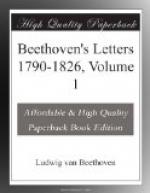The death of my brother two months ago, which, owing to the guardianship of my nephew having devolved on me, has involved me in all sorts of annoyances and perplexities, has caused this delay in my answer. In the mean time, the poem of Herr van Seyfried is already begun, and I purpose shortly to set it to music. I need not tell you how very flattering I consider such a commission, for how could I think otherwise? and I shall endeavor to acquit myself as honorably as my poor talents will admit of.
With regard to our artistic resources, when the time for the performance arrives I shall certainly take into consideration those usually at our disposal, without, however, strictly limiting myself to them. I hope I have made myself clearly understood on this point. As I am urged to say what gratuity I require in return, I beg to know whether the Society will consider 400 gold ducats a proper remuneration for such a work? I once more entreat the forgiveness of the Society for the delay in my answer, but I am in some degree relieved by knowing that, at all events, you, my dear friend, have already verbally apprised the Society of my readiness to write a work of the kind.[1]
Ever, my worthy Z., your
BEETHOVEN.
[Footnote 1: In the Fischof’sche Handschrift we are told:—“The allusion to ‘our artistic resources’ requires some explanation. Herr v. Zmeskall had at that time received instructions to give a hint to the great composer (who paid little regard to the difficulty of executing his works) that he must absolutely take into consideration the size of the orchestra, which at grand concerts amounted to 700 performers. The Society only stipulated for the exclusive right to the work for one year, and did not purchase the copyright; they undertook the gratuity for the poem also, so they were obliged to consult their pecuniary resources, and informed the composer that they were prepared to give him 200 gold ducats for the use of the work for a year, as they had proposed. Beethoven was quite satisfied, and made no objection whatever; he received an advance on this sum according to his own wish, the receipt of which he acknowledged in 1819. Beethoven rejected the first poem selected, and desired to have another. The Society left his choice quite free. Herr Bernhard undertook to supply a new one. Beethoven and he consulted together in choosing the subject, but Herr Bernhard, overburdened by other business, could only send the poem bit by bit. Beethoven, however, would not begin till the whole was in his hands.”]
164.
TO MDLLE. MILDER-HAUPTMANN.[1]
Vienna, Jan. 6, 1816.
MY HIGHLY VALUED MDLLE. MILDER, MY DEAR FRIEND,—




